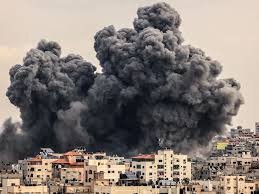Israeli army intensifies attacks on civilians
Rafah comes under intense bombardment

TEHRAN - The Israeli occupation regime has been pounding the totally blockaded Gaza Strip for more than 230 consecutive days. Yet, Israeli warplanes and tanks committed more massacres against civilians on Saturday. It has also intensified its bombardment of Rafah in the southernmost part of the Strip.
The regime’s fighter jets continued to bomb Rafah, destroying entire residential buildings in some neighborhoods. The areas of Shoka and al-Jeninah in particular witnessed intense airstrikes and artillery shells.
Reporters on the ground confirmed that, for the first time, occupation forces are deploying fire belts where Israel fires many missiles on a single location in the city center. They said the city center came under intense air and artillery attacks at night, leading to multiple civilian casualties.
Residential buildings near the Kuwaiti Hospital in Rafah have also been struck, according to Al Jazeera.
In northern Gaza City, civilians were killed on Saturday by airstrikes, with local sources confirming residents were forced to pull dead bodies and the wounded from under the rubble of a house in the al-Daraj neighborhood.
Bombs that dropped on northern Gaza’s Beit Hanoon killed ten people, including women and children. The Jabalia refugee camp, also in the north is still subject to intense airstrikes.
Israeli forces also struck a residential apartment north of the Nusairat refugee camp in central Gaza, while the eastern areas between Deir al-Balah and Khan Younis witnessed Israeli artillery shelling, according to regional journalists on the ground.
Meanwhile, reports have described the humanitarian situation in northern and central Gaza as "catastrophic," with famine spreading in the region.
The United Nations Children's Fund (UNICEF) warned of the imminent shutdown of oxygen generators at the al-Aqsa Martyrs Hospital in central Gaza, stating that "more than 20 newborns' lives are at risk due to fuel shortages" in Gaza.
The medical director of the hospital has said that "a medical crisis will occur if the hospital stops operating due to fuel shortages," explaining that the amount of fuel supplied does not exceed one-fifth of the medical facility’s needs, stressing "we need 50,000 liters of fuel in the coming hours to avoid a health disaster."
Earlier this week, Catherine Russell, the Executive Director of UNICEF, who is among the high-ranking foreign officials who have made a rare trip to the Gaza Strip, condemned what she described as "heartbreaking scenes" and called for "an end to this horror."
Russell said that what she saw and heard "was heartbreaking," adding "(Palestinian children) have endured shelling, loss, and repeated displacement within the Strip. There is no safe haven for the more than one million children in Gaza."
The attacks come as the occupation regime finds itself increasingly isolated on the world stage amid measures taken by United Nations General Assembly and top UN Courts calling for an end to the indiscriminate attacks on civilians in the enclave.
Since October 7, the Israeli military has killed nearly 36,000 people in its relentless bombing campaign. More than 80,200 have been injured according to the health ministry in Gaza. The majority of the casualties have been women and children.
The ministry said on Saturday that at least 46 people have been killed and 130 others injured in the latest 24-hour reporting period.
The Israeli bombardment and invasion of southern Gaza’s Rafah city have shut down the only operating land crossing for the trickle of humanitarian aid that was entering the enclave since October. The crossing with Egypt has been closed for 17 days now.
Leave a Comment